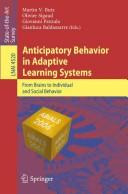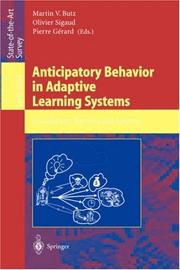| Listing 1 - 10 of 18 | << page >> |
Sort by
|

ISBN: 9783540253792 3540253793 9786610427499 1280427493 3540312315 Year: 2006 Volume: v. 191 Publisher: Berlin, Germany : Springer,
Abstract | Keywords | Export | Availability | Bookmark
 Loading...
Loading...Choose an application
- Reference Manager
- EndNote
- RefWorks (Direct export to RefWorks)
This book offers a comprehensive introduction to learning classifier systems (LCS) – or more generally, rule-based evolutionary online learning systems. LCSs learn interactively – much like a neural network – but with an increased adaptivity and flexibility. This book provides the necessary background knowledge on problem types, genetic algorithms, and reinforcement learning as well as a principled, modular analysis approach to understand, analyze, and design LCSs. The analysis is exemplarily carried through on the XCS classifier system – the currently most prominent system in LCS research. Several enhancements are introduced to XCS and evaluated. An application suite is provided including classification, reinforcement learning and data-mining problems. Reconsidering John Holland’s original vision, the book finally discusses the current potentials of LCSs for successful applications in cognitive science and related areas.
Machine learning. --- Apprentissage automatique --- Engineering. --- Neurosciences. --- Artificial intelligence. --- Mathematics. --- Engineering mathematics. --- Appl.Mathematics/Computational Methods of Engineering. --- Artificial Intelligence (incl. Robotics). --- Applications of Mathematics. --- Applied Mathematics --- Civil Engineering --- Computer Science --- Engineering & Applied Sciences --- Civil & Environmental Engineering --- AI (Artificial intelligence) --- Artificial thinking --- Electronic brains --- Intellectronics --- Intelligence, Artificial --- Intelligent machines --- Machine intelligence --- Thinking, Artificial --- Learning, Machine --- Computer science. --- Computers. --- Applied mathematics. --- Computer Science. --- Theory of Computation. --- Bionics --- Cognitive science --- Digital computer simulation --- Electronic data processing --- Logic machines --- Machine theory --- Self-organizing systems --- Simulation methods --- Fifth generation computers --- Neural computers --- Artificial intelligence --- Information theory. --- Mathematical and Computational Engineering. --- Artificial Intelligence. --- Math --- Science --- Neural sciences --- Neurological sciences --- Neuroscience --- Medical sciences --- Nervous system --- Engineering --- Engineering analysis --- Mathematical analysis --- Communication theory --- Communication --- Cybernetics --- Mathematics --- Automatic computers --- Automatic data processors --- Computer hardware --- Computing machines (Computers) --- Electronic calculating-machines --- Electronic computers --- Hardware, Computer --- Computer systems --- Calculators --- Cyberspace
Digital
ISBN: 9783540312314 Year: 2006 Publisher: Berlin, Heidelberg Springer-Verlag
Abstract | Keywords | Export | Availability | Bookmark
 Loading...
Loading...Choose an application
- Reference Manager
- EndNote
- RefWorks (Direct export to RefWorks)
Mathematics --- Neuropathology --- Engineering sciences. Technology --- Artificial intelligence. Robotics. Simulation. Graphics --- neurologie --- analyse (wiskunde) --- toegepaste wiskunde --- ingenieurswetenschappen --- robots
Book
ISBN: 9783540312314 Year: 2006 Publisher: Berlin Heidelberg Springer Berlin Heidelberg
Abstract | Keywords | Export | Availability | Bookmark
 Loading...
Loading...Choose an application
- Reference Manager
- EndNote
- RefWorks (Direct export to RefWorks)
This book offers a comprehensive introduction to learning classifier systems (LCS) - or more generally, rule-based evolutionary online learning systems. LCSs learn interactively - much like a neural network - but with an increased adaptivity and flexibility. This book provides the necessary background knowledge on problem types, genetic algorithms, and reinforcement learning as well as a principled, modular analysis approach to understand, analyze, and design LCSs. The analysis is exemplarily carried through on the XCS classifier system - the currently most prominent system in LCS research. Several enhancements are introduced to XCS and evaluated. An application suite is provided including classification, reinforcement learning and data-mining problems. Reconsidering John Holland's original vision, the book finally discusses the current potentials of LCSs for successful applications in cognitive science and related areas.
Mathematics --- Neuropathology --- Engineering sciences. Technology --- Artificial intelligence. Robotics. Simulation. Graphics --- neurologie --- analyse (wiskunde) --- toegepaste wiskunde --- ingenieurswetenschappen --- robots
Book
ISBN: 9780198739692 Year: 2017 Publisher: Oxford Oxford University Press
Abstract | Keywords | Export | Availability | Bookmark
 Loading...
Loading...Choose an application
- Reference Manager
- EndNote
- RefWorks (Direct export to RefWorks)
Book
ISBN: 3540877010 3540877029 Year: 2008 Publisher: Berlin, Heidelberg : Springer Berlin Heidelberg : Imprint: Springer,
Abstract | Keywords | Export | Availability | Bookmark
 Loading...
Loading...Choose an application
- Reference Manager
- EndNote
- RefWorks (Direct export to RefWorks)
This book proposes a unifying approach for the analysis and design of artificial cognitive systems: The Anticipatory Approach. In 11 coherent chapters, the authors of this State-of-the-Art Survey propose a foundational view of the importance of dealing with the future, of gaining some autonomy from current environmental data, and of endogenously generating sensorimotor and abstract representations. A meaningful taxonomy for anticipatory cognitive mechanisms is put forward, which distinguishes between the types of predictions and the different influences of these predictions on actual behavior and learning. Thus a new unifying perspective on cognitive systems is given. The Anticipatory Approach described in this book will not only aid in the analysis of cognitive systems, but will also serve as an inspiration and guideline for the progressively more advanced and competent design of large, but modular, artificial cognitive systems.
Expectation (Psychology) --- Cognitive learning theory --- Cognitive neuroscience --- Brain --- Computer Science --- Mechanical Engineering - General --- Neuroscience --- Engineering & Applied Sciences --- Mechanical Engineering --- Human Anatomy & Physiology --- Health & Biological Sciences --- Mathematical models --- Information Technology --- Artificial Intelligence --- Artificial intelligence. --- Cognitive neuroscience. --- Conscious automata. --- Prediction (Logic) --- System design. --- Design, System --- Systems design --- Conjecture --- Artificial consciousness --- Electronic brains --- Intelligent machines --- Mechanical brains --- Synthetic consciousness --- Cognitive neuropsychology --- AI (Artificial intelligence) --- Artificial thinking --- Intellectronics --- Intelligence, Artificial --- Machine intelligence --- Thinking, Artificial --- Computer science. --- Computer programming. --- Mathematical statistics. --- Computers. --- User interfaces (Computer systems). --- Computer simulation. --- Computer Science. --- Artificial Intelligence (incl. Robotics). --- Programming Techniques. --- Simulation and Modeling. --- Models and Principles. --- Probability and Statistics in Computer Science. --- User Interfaces and Human Computer Interaction. --- Bionics --- Cognitive science --- Digital computer simulation --- Electronic data processing --- Logic machines --- Machine theory --- Self-organizing systems --- Simulation methods --- Fifth generation computers --- Neural computers --- Computer modeling --- Computer models --- Modeling, Computer --- Models, Computer --- Simulation, Computer --- Electromechanical analogies --- Model-integrated computing --- Interfaces, User (Computer systems) --- Human-machine systems --- Human-computer interaction --- Automatic computers --- Automatic data processors --- Computer hardware --- Computing machines (Computers) --- Electronic calculating-machines --- Electronic computers --- Hardware, Computer --- Computer systems --- Cybernetics --- Calculators --- Cyberspace --- Mathematics --- Statistical inference --- Statistics, Mathematical --- Statistics --- Probabilities --- Sampling (Statistics) --- Computers --- Electronic computer programming --- Electronic digital computers --- Programming (Electronic computers) --- Coding theory --- Informatics --- Science --- Statistical methods --- Programming --- System analysis --- Judgment (Logic) --- Consciousness --- Biocomputers --- Perceptrons --- Neuropsychology --- Artificial Intelligence. --- Mathematical models. --- Cognitive theory of learning --- Learning, Psychology of --- Motivation (Psychology) --- Models
Digital
ISBN: 9783540742623 Year: 2007 Publisher: Berlin, Heidelberg Springer-Verlag Berlin Heidelberg
Abstract | Keywords | Export | Availability | Bookmark
 Loading...
Loading...Choose an application
- Reference Manager
- EndNote
- RefWorks (Direct export to RefWorks)
Social sciences (general) --- Complex analysis --- Computer science --- Artificial intelligence. Robotics. Simulation. Graphics --- Computer. Automation --- complexe analyse (wiskunde) --- automatisering --- informatica --- maatschappij --- sociale wetenschappen --- KI (kunstmatige intelligentie) --- robots

ISBN: 9783540742616 3540742611 354074262X Year: 2007 Publisher: Berlin ; Heidelberg : Springer,
Abstract | Keywords | Export | Availability | Bookmark
 Loading...
Loading...Choose an application
- Reference Manager
- EndNote
- RefWorks (Direct export to RefWorks)
Anticipatory behavior in adaptive learning systems is steadily gaining the - terest of scientists, although many researchers still do not explicitly consider the actual anticipatory capabilities of their systems. Similarly to the previous two workshops, the third workshop on anticipatory behavior in adaptive lea- ing systems (ABiALS 2006) has shown yet again that the similarities between di?erent anticipatory mechanisms in diverse cognitive systems are striking. The discussions and presentations on the workshop day of September 30th, 2006, during the Simulation of Adaptive Behavior Conference (SAB 2006), con?rmed that the investigations into anticipatory cognitive mechanisms for behavior and learning strongly overlap among researchers from various disciplines, including the whole interdisciplinary cognitive science area. Thus, further conceptualizations of anticipatory mechanisms seem man- tory. The introductory chapter of this volume therefore does not only provide an overview of the contributions included in this volume but also proposes a taxonomy of how anticipatory mechanisms can improve adaptive behavior and learning in cognitive systems. During the workshop it became clear that ant- ipations are involved in various cognitive processes that range from individual anticipatory mechanisms to social anticipatory behavior. This book re?ects this structure by ?rst providing neuroscienti?c as well as psychological evidence for anticipatorymechanismsinvolvedinbehavior,learning,language,andcognition. Next,individualpredictivecapabilitiesandanticipatorybehaviorcapabilitiesare investigated. Finally, anticipation relevant in social interaction is studied.
Machine learning --- Expectation (Philosophy) --- Apprentissage automatique --- Congresses. --- Congrès --- Computer Science --- Mechanical Engineering - General --- Engineering & Applied Sciences --- Mechanical Engineering --- Information Technology --- Artificial Intelligence --- Anticipation (Philosophy) --- Computer science. --- Computers. --- Algorithms. --- Artificial intelligence. --- Application software. --- Computers and civilization. --- Control engineering. --- Robotics. --- Mechatronics. --- Computer Science. --- Artificial Intelligence (incl. Robotics). --- Computation by Abstract Devices. --- Algorithm Analysis and Problem Complexity. --- Computer Appl. in Social and Behavioral Sciences. --- Computers and Society. --- Control, Robotics, Mechatronics. --- Algorism --- Algebra --- Arithmetic --- Automatic computers --- Automatic data processors --- Computer hardware --- Computing machines (Computers) --- Electronic brains --- Electronic calculating-machines --- Electronic computers --- Hardware, Computer --- Computer systems --- Cybernetics --- Machine theory --- Calculators --- Cyberspace --- Informatics --- Science --- Mechanical engineering --- Microelectronics --- Microelectromechanical systems --- Automation --- Control engineering --- Control equipment --- Control theory --- Engineering instruments --- Programmable controllers --- Civilization and computers --- Civilization --- Application computer programs --- Application computer software --- Applications software --- Apps (Computer software) --- Computer software --- AI (Artificial intelligence) --- Artificial thinking --- Intellectronics --- Intelligence, Artificial --- Intelligent machines --- Machine intelligence --- Thinking, Artificial --- Bionics --- Cognitive science --- Digital computer simulation --- Electronic data processing --- Logic machines --- Self-organizing systems --- Simulation methods --- Fifth generation computers --- Neural computers --- Foundations --- Philosophy --- Computer software. --- Social sciences --- Artificial Intelligence. --- Data processing. --- Software, Computer

ISBN: 3540450025 3540404295 Year: 2003 Publisher: Berlin, Heidelberg : Springer Berlin Heidelberg : Imprint: Springer,
Abstract | Keywords | Export | Availability | Bookmark
 Loading...
Loading...Choose an application
- Reference Manager
- EndNote
- RefWorks (Direct export to RefWorks)
Machine learning --- Expectation (Philosophy) --- Computer Science --- Engineering & Applied Sciences --- Anticipation (Philosophy) --- Computer science. --- Computers. --- Algorithms. --- Artificial intelligence. --- Application software. --- Control engineering. --- Robotics. --- Mechatronics. --- Automation. --- Computer Science. --- Artificial Intelligence (incl. Robotics). --- Robotics and Automation. --- Computation by Abstract Devices. --- Algorithm Analysis and Problem Complexity. --- Computer Appl. in Social and Behavioral Sciences. --- Control, Robotics, Mechatronics. --- Philosophy --- Computer software. --- Social sciences --- Artificial Intelligence. --- Data processing. --- AI (Artificial intelligence) --- Artificial thinking --- Electronic brains --- Intellectronics --- Intelligence, Artificial --- Intelligent machines --- Machine intelligence --- Thinking, Artificial --- Bionics --- Cognitive science --- Digital computer simulation --- Electronic data processing --- Logic machines --- Machine theory --- Self-organizing systems --- Simulation methods --- Fifth generation computers --- Neural computers --- Mechanical engineering --- Microelectronics --- Microelectromechanical systems --- Control engineering --- Control equipment --- Control theory --- Engineering instruments --- Automation --- Programmable controllers --- Application computer programs --- Application computer software --- Applications software --- Apps (Computer software) --- Computer software --- Algorism --- Algebra --- Arithmetic --- Automatic computers --- Automatic data processors --- Computer hardware --- Computing machines (Computers) --- Electronic calculating-machines --- Electronic computers --- Hardware, Computer --- Computer systems --- Cybernetics --- Calculators --- Cyberspace --- Automatic factories --- Automatic production --- Computer control --- Engineering cybernetics --- Factories --- Industrial engineering --- Mechanization --- Assembly-line methods --- Automatic control --- Automatic machinery --- CAD/CAM systems --- Robotics --- Foundations
Book
ISBN: 9783540877028 9783540877011 Year: 2008 Publisher: Berlin Heidelberg Springer Berlin Heidelberg
Abstract | Keywords | Export | Availability | Bookmark
 Loading...
Loading...Choose an application
- Reference Manager
- EndNote
- RefWorks (Direct export to RefWorks)
This book proposes a unifying approach for the analysis and design of artificial cognitive systems: The Anticipatory Approach. In 11 coherent chapters, the authors of this State-of-the-Art Survey propose a foundational view of the importance of dealing with the future, of gaining some autonomy from current environmental data, and of endogenously generating sensorimotor and abstract representations. A meaningful taxonomy for anticipatory cognitive mechanisms is put forward, which distinguishes between the types of predictions and the different influences of these predictions on actual behavior and learning. Thus a new unifying perspective on cognitive systems is given. The Anticipatory Approach described in this book will not only aid in the analysis of cognitive systems, but will also serve as an inspiration and guideline for the progressively more advanced and competent design of large, but modular, artificial cognitive systems.
informatietechnologie --- Computer. Automation --- robots --- simulaties --- informatica --- vormgeving --- Operational research. Game theory --- Artificial intelligence. Robotics. Simulation. Graphics --- Computer science --- stochastische analyse --- Computer science. --- Artificial intelligence. --- Computer simulation. --- Informatique --- Intelligence artificielle --- Simulation par ordinateur --- EPUB-LIV-FT LIVINFOR SPRINGER-B
Book
ISBN: 9783642025655 Year: 2009 Publisher: Berlin Heidelberg Springer Berlin Heidelberg
Abstract | Keywords | Export | Availability | Bookmark
 Loading...
Loading...Choose an application
- Reference Manager
- EndNote
- RefWorks (Direct export to RefWorks)
Anticipatory behavior in adaptive learning systems continues to attract the attention of researchers in many areas, including cognitive systems, neuroscience, psychology, and machine learning. This book constitutes the thoroughly refereed post-workshop proceedings of the 4th International Workshop on Anticipatory Behavior in Adaptive Learning Systems, ABiALS 2008, held in Munich, Germany, in June 2008, in collaboration with 5th the six-monthly meeting of euCognition, 'The Role of Anticipation in Cognition'. The 18 revised full papers presented were carefully selected during two rounds of reviewing and improvement for inclusion in the book. The introductory chapter of this state-of-the-art survey not only provides an overview of the contributions included in this volume but also discusses the current various terminology employed in the field and relates it to the various system approaches. The papers are organized in topical sections on anticipation in psychology with a focus on the ideomotor view; theoretical and review contributions; anticipation and dynamical systems; computational modeling of psychological processes in the individual and social domains; behavioral and cognitive capabilities based on anticipation; and computational frameworks and algorithms for anticipation, and their evaluation.
Social sciences (general) --- Complex analysis --- Computer science --- Artificial intelligence. Robotics. Simulation. Graphics --- Computer. Automation --- complexe analyse (wiskunde) --- automatisering --- informatica --- maatschappij --- sociale wetenschappen --- KI (kunstmatige intelligentie) --- robots
| Listing 1 - 10 of 18 | << page >> |
Sort by
|

 Search
Search Feedback
Feedback About UniCat
About UniCat  Help
Help News
News